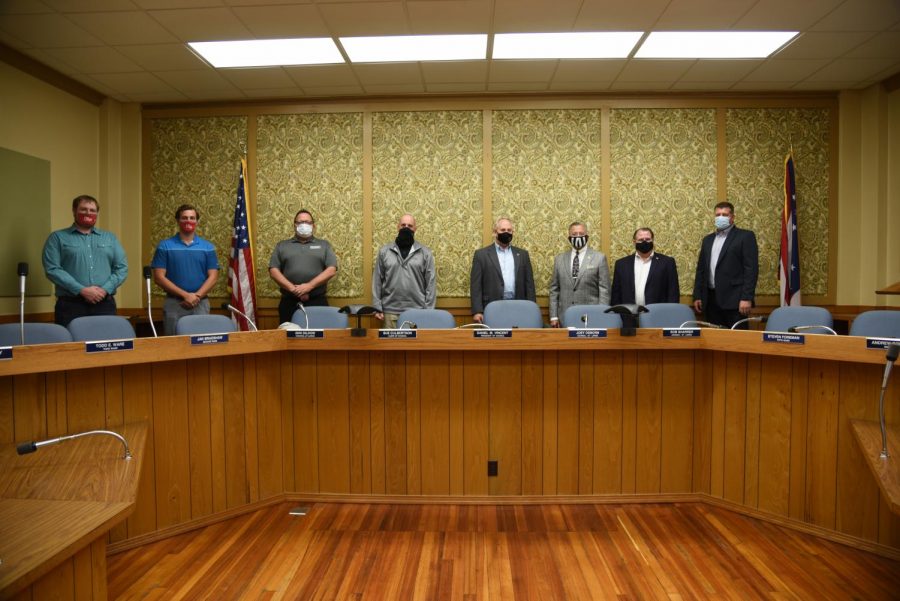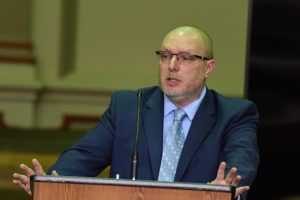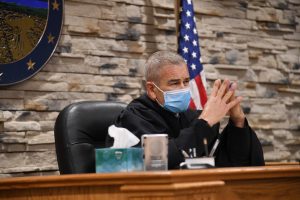Round table held with city and state leaders
September 3, 2020
A round table was held Thursday morning at the Zanesville City Hall, where city and state officials met to discuss various topics including federal funding related to the Coronavirus pandemic.
Ohio State Auditor Keith Faber was the keynote speaker, who provided details on the best practices for tracking funds sourced by the C.A.R.E.S. Act and his office’s goal of ensuring state-reported Coronavirus numbers are legitimate.
Zanesville Mayor Don Mason organized the event which was centered around the economy, managing C.A.R.E.S. Act funding, fiscal responsibility and plans for protecting local jobs.
Mason said the city had used a portion of their federal funds to buy Chromebooks for students, many of whom were going to class remotely.
Along with computers, the city also purchased WiFi carts, which help to serve students who have insufficient internet at home to complete their coursework.
While Mason said the city continues to look into how to spend their federal dollars, the priority will be primarily focused on children, the elderly and those low-income residents who have been impacted the most.
Faber and one of his senior staff members, who attended by teleconference, spoke at length on the proper and improper uses of C.A.R.E.S. Act funding by local governments and ways in which to ensure those entities stay in compliance when reporting their spending later this year.
According to Faber, the state is also looking to address how municipal income tax is levied now that many workers are approaching the reality of a long term work from home situation.
Citing an example of an employee who might live in Zanesville and commute to Downtown Columbus, but now finds themselves working from home, Fabor explained that as those temporary solutions turn into permeant work from home situations, the income tax will likely need to be properly allocated to the correct government entity.
Mason said in response that he believes Zanesville will likely find themselves in a situation with minimal impact after calculating both the gains and losses, saying larger municipalities, such as Columbus, might see a larger loss of revenue.
Faber also said his office, as the state’s official auditing agency, will be looking into and ensuring the accuracy of the state’s COVID-19 infection and death counts.
Those who have knowledge of potential issues with inaccurate COVID-19 numbers, concerns or questions should visit ohioauditor.gov
Ohio State Senator Tim Schaffer spoke on the additional money the Muskingum County community is likely to receive following the passage of a funding bill Wednesday by the State Senate.
Under current projections, which are still subject to decisions by the State House of Representatives and ultimately Ohio Governor Mike DeWine, there will be an additional transfer of $3.1 million to the county government and $906,000 to the City of Zanesville.
While the state has acted as a pass-through for federal C.A.R.E.S. Act funds, all government entities within Muskingum County have received a total of $6.2 million to date, according to Schaffer.
Adam Holmes, a local representative to the Ohio House of Representatives, was also on the panel and provided insight on the effects of the business community.
As a business owner himself, whose business received both C.A.R.E.S. Act and PPP funds, Holmes said Faber’s advice was very insightful as to how funds should be spent and accounted.
Also in attendance Thursday was Dana Matz from the Zanesville/Muskingum County Chamber of Commerce, Matt Abbott from the Zanesville-Muskingum County Port Authority, Matt Schley from the City’s Community Development Department and Kade Haddox from the City’s Budget and Finance Department.















